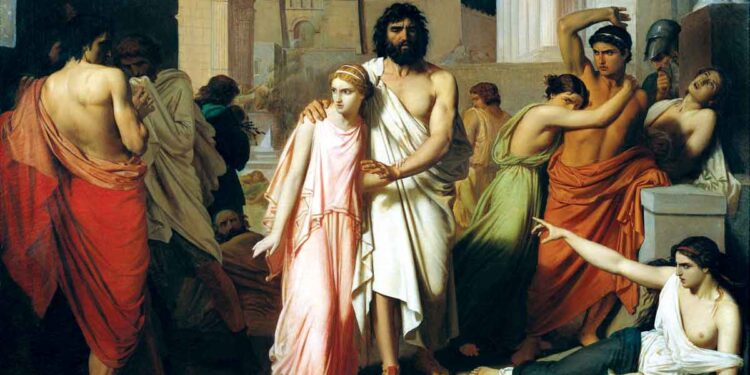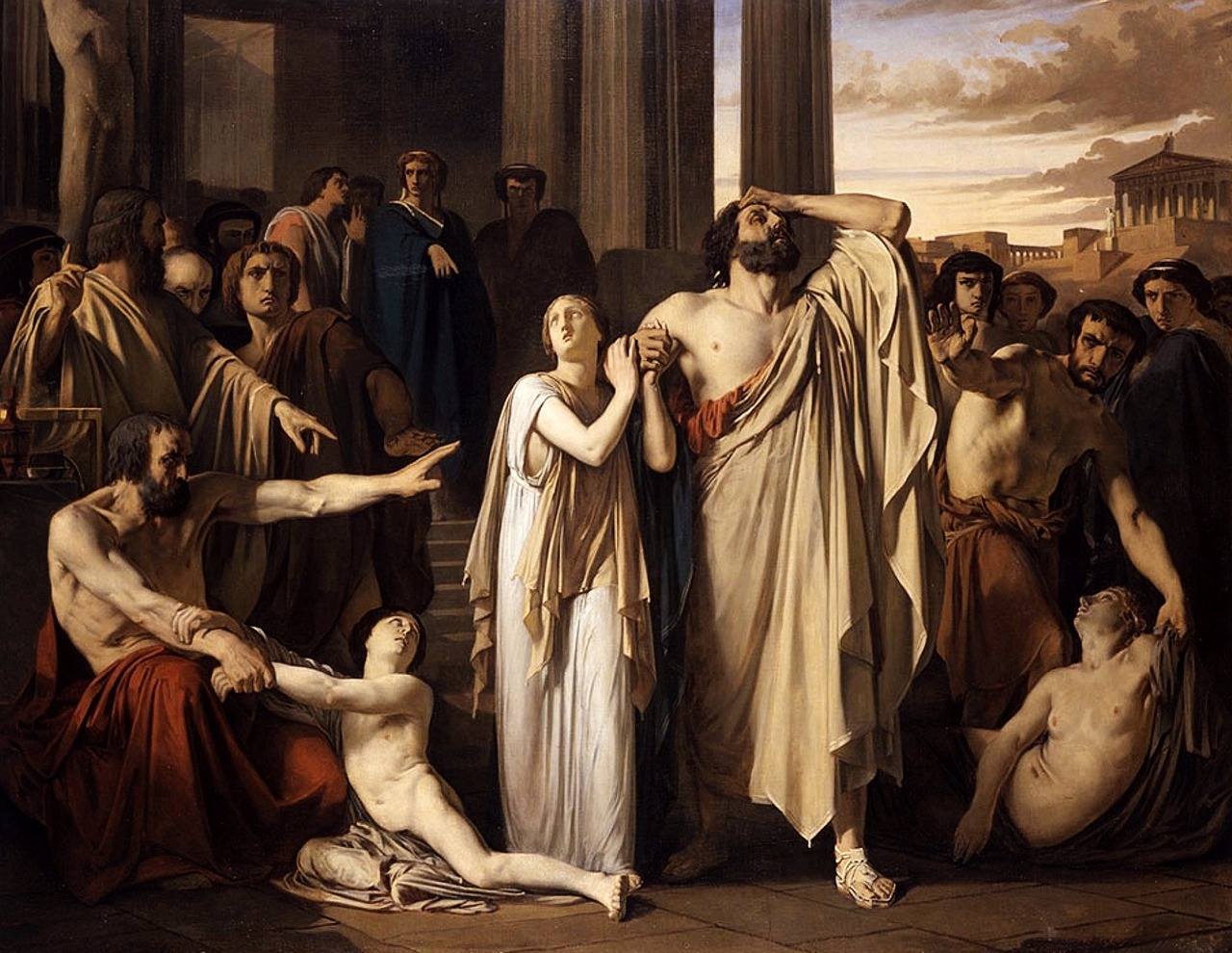Peripeteia in Oedipus Rex by Sophocles
The word peripeteia, which comes from the Greek word “reversal,” describes a sudden and unanticipated change in circumstances that frequently results in a turning point in a story. Peripeteia is a key element in Greek tragedy that propels the story toward its tragic resolution. The protagonist experiences a turnabout in their circumstances, going from a state of prosperity or happiness to one of adversity or despair.
Peripeteia in Oedipus Rex by Sophocles-Sophocles uses peripeteia in Oedipus Rex to reveal the fate of Oedipus, the king of Thebes, who is initially praised for deciphering the Sphinx’s riddle and rescuing the city. But this turn of events initiates a sequence of events that culminate in Oedipus’s tragic demise.
Also Read-
- Examine the purpose spontaneity, emotions and personality serve in Wordsworth’s theory of poetry
- Why does Plato want the artists to be kept away from the ideal state
- Exploring Romantic and Modernist Conceptions of Character in the Protagonist
Peripeteia in Oedipus Rex by Sophocles-Sophocles’ “Oedipus Rex” stands as a timeless masterpiece of Greek tragedy, exploring the complexities of fate, free will, and the inevitability of human suffering. At the heart of this tragic play lies the concept of peripeteia, a pivotal element that propels the narrative from prosperity to ruin.
Peripeteia in Oedipus Rex:
- The Triumph of Oedipus:
- Thebes is under the control of a terrible plague at the beginning of the play. Oedipus assumes responsibility for identifying the source of the plague and putting an end to his people’s suffering because he is determined to save his city. He is hailed as a hero and savior by the Theban people for his victory over the mythological creature known as the Sphinx, which has a riddle. Oedipus is placed in a position of power and prosperity following this first victory.
- The Oracle’s Revelation:
- Thebes is under the control of a terrible plague at the beginning of the play. Oedipus assumes responsibility for identifying the source of the plague and putting an end to his people’s suffering because he is determined to save his city. He is hailed as a hero and savior by the Theban people for his victory over the mythological creature known as the Sphinx, which has a riddle. Oedipus is placed in a position of power and prosperity following this first victory.
- Oedipus’s Investigation:
- Oedipus, driven by a sense of duty and a desire to save his city, embarks on an investigation to uncover the truth about the murder. Ironically, his determination to root out the murderer becomes the very means by which he discovers his own guilt. The peripeteia is intensified as Oedipus gradually unravels the layers of his own tragic history, revealing a complex web of prophecy, patricide, and incest.
- Recognition of Truth:
- The pinnacle of peripeteia occurs when Oedipus realizes the horrifying truth about his identity and the prophecy that foretold his destiny. The recognition that he is the murderer he has been seeking and that he has unwittingly married his own mother is a moment of profound reversal. The joyous triumph that marked the beginning of the play gives way to the devastating revelation of Oedipus’s tragic fate.
- Descent into Tragedy:
- The peripeteia sets Oedipus on a downward spiral, leading to his self-inflicted punishment. Blinded and broken, Oedipus becomes the embodiment of tragic inevitability. The reversal of his fortune is not only a personal tragedy but also a reflection of the broader theme of the tragic flaw (hamartia) and the inescapable nature of fate in Greek tragedy.
Significance of Peripeteia in Oedipus Rex:
- Catharsis and Emotional Impact:
- The use of peripeteia in “Oedipus Rex” serves to evoke catharsis, the purging of emotions, in the audience. The sudden and tragic reversal experienced by Oedipus elicits pity and fear, fundamental emotions in Aristotle’s theory of tragedy. As the audience witnesses the unraveling of Oedipus’s fate, they are confronted with the fragility of human existence and the inescapable grasp of destiny.
- Exploration of Fate vs. Free Will:
- Peripeteia in “Oedipus Rex” is intricately linked to the exploration of fate versus free will. Despite Oedipus’s earnest attempts to defy the prophecy and shape his own destiny, the very actions he takes to avoid the foretold fate contribute to its fulfillment. The peripeteia underscores the tragic irony inherent in the struggle between human agency and the predetermined course of life.
- Tragic Flaw and Hubris:
- Oedipus’s tragic reversal is closely tied to his tragic flaw, or hubris – excessive pride and arrogance. His unwavering confidence in his ability to solve the riddle of the Sphinx and uncover the truth becomes the catalyst for his downfall. The peripeteia accentuates the consequences of Oedipus’s overestimation of his own agency and intellect, reinforcing the thematic elements of hubris and nemesis.
- Irony and Dramatic Tension:
- Sophocles employs dramatic irony throughout “Oedipus Rex,” with the audience being aware of Oedipus’s true identity while he remains oblivious. The peripeteia amplifies this irony, creating tension as the audience witnesses Oedipus’s relentless pursuit of the truth, all the while anticipating the tragic revelation that awaits him. The interplay of dramatic irony and peripeteia heightens the emotional impact of the unfolding tragedy.














